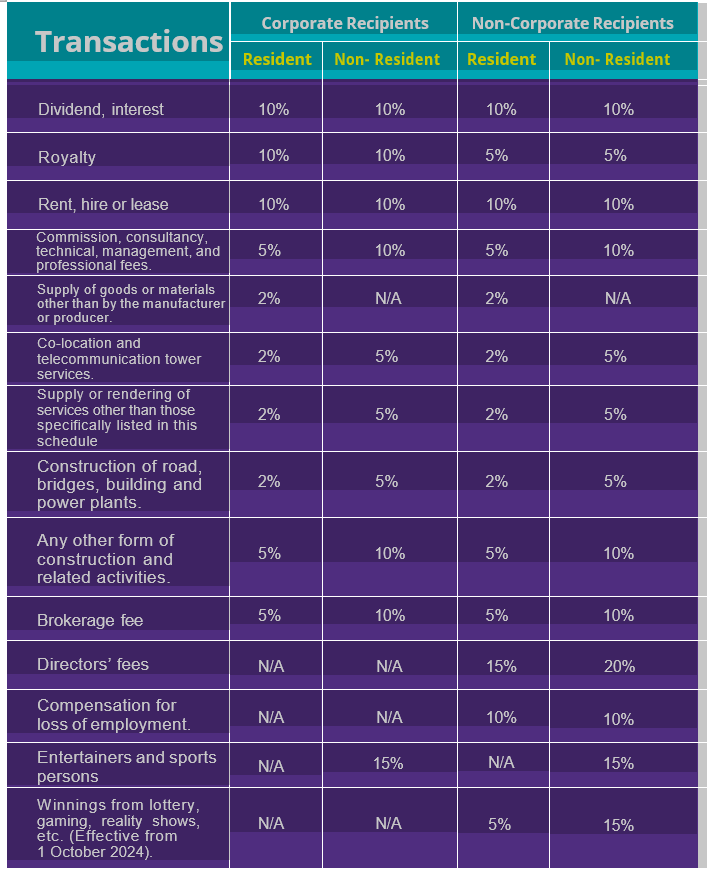
Introduction
Nigeria’s Minister of Finance signed the Deduction of Tax at Source (Withholding) Regulations 2024, otherwise known as the “WHT Regulations 2024” on July 1, 2024, the day it also became effective, as part of the government’s economic reforms. The new Regulations made several modifications to the Withholding Tax (WHT) system in Nigeria, which was introduced into the country in 1977.
Highlights of the changes
WHT is a tax collection mechanism that serves as an advance payment of income tax. It is deducted at source directly from payments for required transactions. Except where the applicable laws stipulate that the WHT constitutes a final tax, it is mostly credited against income tax liabilities.
The WHT is to be deducted at source on eligible transactions at an applicable rate as specified in the First Schedule to the regulations. Also, it is applicable at rates specified under treaties between Nigeria and other countries for the avoidance of Double Taxation. Where the supplier has no Tax Identification Number (TIN), the rate shall be twice the rate specified in the schedule.
Persons exempted from making deductions
Those exempted from deducting WHT are:
- Individuals
- Small businesses and unincorporated entities (with turnover less than N25million per annum) are exempted from deducting WHT on the condition that their vendor has a valid TIN, and the value of the transaction is N2,000,000 or less during the relevant calendar month. However, if a transaction from their supplier is higher than NGN2,000,000 during the relevant calendar month and the vendor has a valid TIN, the small company shall deduct and remit the WHT.
Persons required to make deductions
The Regulations require all entities, including businesses, tax-exempt organizations, government ministries, departments, agencies, and their payment agents to deduct WHT on applicable transactions. These include:
a) A body, corporate or unincorporated, other than an individual
b) A Government, Ministry, Department or Agency
c) A Statutory body
d) A Public Authority
e) Any other institution, organization, establishment or enterprise including those exempts from tax
f) A payment agent on behalf of any person in (a-e) above
When to deduct
The Regulations explain that WHT must be deducted from transactions among unrelated parties at the earliest of when payment is made or amount due is otherwise settled. However, obligation to deduct WHT is applicable to transactions involving related parties at the earlier of the liability’s recognition or payment.
Remittance of amount deducted at source
Federal Inland Revenue Service (FIRS) - the remittance to the FIRS remains due by the 21st of the following month.
State Internal Revenue Service (SIRS) - the remittance to the relevant SIRS remains due by the 30th of the following month.
Capital Gains Tax (CGT) and Pay As You Earn (PAYE) - the Regulations specify that CGT withheld from payments to individuals must be remitted to the relevant SIRS by the 10th of the following month, in a manner like income tax payments under the PAYE scheme.
Persons required to issue WHT receipts
The Regulations stipulate that it is the deduction agent’s (payer’s) responsibility, not the tax
authority’s, to issue a receipt for the tax deducted to their vendor. The vendor can present the receipt as proof of WHT deduction to the relevant tax authority, regardless of whether the deduction agent has remitted the WHT or not.
Offenses and Penalties
Non-Remittance: A taxpayer who fails to remit the amount that has been deducted shall be held liable for the WHT, along with any applicable interest and penalties as prescribed by relevant laws.
Non-Deduction: A taxpayer that did not deduct WHT but paid their suppliers in full will be subject to administrative penalty and an annual interest, as opposed to the current practice of requiring such customers to also pay the WHT.
Transactions exempted from WHT
The Regulations include the following as WHT exempt:
- Goods manufactured or materials produced by the person making the supply. The Regulations define manufacturing/production to include the production of energy, including electricity, gas and petroleum products.
- Compensating payments under a Registered Securities Lending Transaction;
- Distribution or dividend payment to a Real Estate Investment Trust or Real Estate Investment Company
- Across-the-counter transactions, i.e. transactions carried out between parties without an established or prior contractual relationship and in which payment is made on the spot.
- Interest and fees paid to a Nigerian bank by way of direct debits to accounts in the banks
- Out-of-pocket expenses normally expected to be incurred by the supplier distinguishable from contract fees
- Insurance premium
- Supply of Liquefied Petroleum Gas, Compressed Natural Gas (CNG), Premium Motor Spirits (PMS), Automotive Gas Oil (AGO), Low Pour Fuel Oil (LPFO), Dual Purpose Kerosene (DPK) and JET-A1
- Commission retained by broker from monies collected on behalf of principal in line with the industry norm
- Winnings from a game of chance or a reality show with contents designed to promote entrepreneurship, academics, and technological or scientific innovation.
- Imported goods where the transaction does not create a taxable presence in Nigeria for the foreign supplier
- Any payment in respect of income or profit which is exempt from tax
Eligible transactions and applicable rates
As contained in the deduction of tax at source (withholding) regulations 2024.

Conclusion
In summary, the Federal Government's review of the Deduction at Source (Withholding) Regulations represents a significant advancement on Nigeria's tax administration. The new regulation introduced critical changes to the Withholding Tax regime. It extends the obligation to deduct WHT to more entities, clarifies the controversial "ordinary course of business," and specifies the timelines and responsibilities for tax remittance, including the issuance of credit receipts. We believe the adjustments are intended to strengthen compliance and improve tax collection, thereby widening Nigeria's tax system.
Contact

Nkwachi Abuka Principal Partner & Head, Tax Services
T : +234 8033736625
E : nkwachi.abuka@ng.gt.com

Ajayi Irivboje Partner, Tax Services
T : +234 7060471514
E : ajayi.irivboje@ng.gt.com

Ayobami Salam
Senior Manager, Tax service
+234 (0) 806 723 6745
ayobami.salam@ng.gt.com

Tokunboh Oyeyemi
Senior Manager, Tax service
+234 (0) 803 426 8118
tokunboh.oyeyemi@ng.gt.com
www.grantthornton.com.ng
info@ng.gt.com
